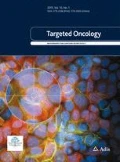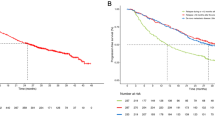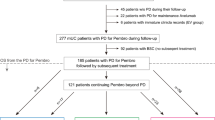Abstract
Osimertinib (Tagrisso™) is an oral, CNS-active, third-generation epidermal growth factor receptor (EGFR) tyrosine kinase inhibitor (TKI) that targets EGFR TKI-sensitizing mutations and, crucially, the T790M mutation that often underlies acquired resistance to EGFR TKI therapy. Osimertinib has been approved in numerous countries for use in patients with T790M-positive advanced NSCLC. In the pivotal, international AURA3 trial in patients with T790M-positive advanced NSCLC who had disease progression after EGFR TKI therapy, osimertinib treatment significantly prolonged progression-free survival (PFS; primary endpoint) compared with platinum-pemetrexed therapy at the time of the primary analysis. PFS results were consistent across predefined subgroups of patients, including those with CNS metastases at baseline. There was no difference between treatment groups in overall survival at 26% maturity. Objective response rates (ORRs) and patient-reported outcomes for prespecified symptoms were also significantly improved with osimertinib relative to platinum-pemetrexed, with CNS ORRs in patients with CNS metastases more than twofold higher in the osimertinib than in the platinum-pemetrexed group. Osimertinib had a manageable tolerability profile, with relatively few patients permanently discontinuing treatment because of adverse events (AEs). With limited treatment options available in this setting, osimertinib is an important option in adult patients with advanced EGFR T790M-positive NSCLC.


Similar content being viewed by others
References
American Cancer Society. Non-small cell lung cancer. 2016. http://www.cancer.org/. Accessed 28 Jun 2017.
World Health Organization. GLOBOCAN 2012: estimated cancer incidence, mortality and prevalence worldwide in 2012. 2012. http://globocan.iarc.fr/. Accessed 28 Jun 2017.
Wang S, Cang S, Liu D. Third-generation inhibitors targeting EGFR T790M mutation in advanced non-small cell lung cancer. J Hematol Oncol. 2016;9:34.
Tan CS, Gilligan D, Pacey S. Treatment approaches for EGFR-inhibitor-resistant patients with non-small-cell lung cancer. Lancet Oncol. 2015;16:e447–59.
National Comprehensive Cancer Network. NCCN guidelines version 4.2017: non-small cell lung cancer. 2017. http://www.nccn.org. Accessed 28 Jun 2017.
Novello S, Barlesi F, Califani R, et al. Metastatic non-small-cell lung cancer: ESMO clinical practice guidelines for diagnosis, treatment and follow-up. Ann Oncol. 2016;27(Suppl 5):v1–v27.
Khozin S, Weinstock C, Blumenthal GM, et al. Osimertinib for the treatment of metastatic EGFR T970M mutation-positive non-small cell lung cancer. Clin Cancer Res. 2016;23(9):2131–5.
Pirker R. Third-generation epidermal growth factor receptor tyrosine kinase inhibitors in advanced nonsmall cell lung cancer. Curr Opin Oncol. 2016;28(2):115–21.
AstraZeneca. Tagrisso approved in China as first-in-class treatment for EGFR T790M mutation-positive metastatic non-small cell lung cancer [media release]. 2017. http://www.astrazeneca.com/. Accessed 28 Jun 2017.
AstraZeneca. Tagrisso tablet 40 mg/ Tagrisso tablet 80 mg: Japanese prescribing information. 2016. http://www.pmda.go.jp/. Accessed 28 Jun 2017.
AstraZeneca. Tagrisso™ (osimertinib) tablets, for oral use: US prescribing information. 2017. http://www.fda.gov/. Accessed 28 Jun 2017.
AstraZeneca. Tagrisso 40 mg/ 80 mg tablets (osimertinib): summary of product characteristics. 2017. http://www.ema.europa.eu/. Accessed 28 Jun 2017.
Oxnard GR, Thress KS, Alden RS, et al. Association between plasma genotyping and outcomes of treatment with osimertinib (AZD9291) in advanced non–small-cell lung cancer. J Clin Oncol. 2016;34(28):3375–82.
Greig SL. Osimertinib: first global approval. Drugs. 2016;76(2):263–73.
Cross DAE, Ashton SE, Ghiorghiu S, et al. AZD9291, an irreversible EGFR TKI, overcomes T790M-mediated resistance to EGFR inhibitors in lung cancer. Cancer Discov. 2014;4(9):1046–61.
Ballard P, Yates JWT, Yang Z, et al. Preclinical comparison of osimertinib with other EGFR-TKIs in EGFR-mutant NSCLC brain metastases models, and early evidence of clinical brain metastases activity. Clin Cancer Res. 2016;22(20):5130–40.
Mok TS, Wu Y-L, Ahn M-J, et al. Osimertinib or platinum–pemetrexed in EGFR T790M–positive lung cancer. N Engl J Med. 2016;376:629–40.
Yang JC, Ahn M-J, Kim D-W, et al. Osimertinib in pretreated T790M-positive advanced non-small-cell lung cancer: AURA study phase II extension component. J Clin Oncol. 2017;35(12):1288–96.
Goss G, Tsai C-M, Shepherd FA, et al. Osimertinib for pretreated EGFR Thr790Met-positive advanced non-small-cell lung cancer (AURA2): a multicentre, open-label, single-arm, phase 2 study. Lancet Oncol. 2016;17(12):1643–52.
Jänne PA, Yang JCH, Kim DW, et al. AZD9291 in EGFR inhibitor-resistant non-small-cell lung cancer. N Engl J Med. 2015;372(18):1689–99.
Brown K, Comisar C, Witjes H, et al. Population pharmacokinetics and exposure-response of osimertinib in patients with non-small cell lung cancer. Br J Clin Pharmacol. 2017;83(6):1216–26.
Planchard D, Loriot Y, Andre F, et al. EGFR-independent mechanisms of acquired resistance to AZD9291 in EGFR T790M-positive NSCLC patients. Ann Oncol. 2015;26(10):2073–8.
Kim TM, Song A, Kim DW, et al. Mechanisms of acquired resistance to AZD9291: a mutation-selective, irreversible EGFR inhibitor. J Thorac Oncol. 2015;10(12):1736–44.
Ortiz-Cuaran S, Scheffler M, Plenker D, et al. Heterogeneous mechanisms of primary and acquired resistance to third-generation EGFR inhibitors. Clin Cancer Res. 2016;22(19):4837–47.
Thress KS, Paweletz CP, Felip E, et al. Acquired EGFR C797S mutation mediates resistance to AZD9291 in non-small cell lung cancer harbouring EGFR T790M. Nat Med. 2015;21(6):560–2.
Planchard D, Brown KH, Kim D-W, et al. Osimertinib Western and Asian clinical pharmacokinetics in patients and healthy volunteers: implications for formulation, dose, and dosing frequency in pivotal clinical studies. Cancer Chemother Pharmacol. 2016;77(4):767–76.
Vishwanathan K, Dickinson PA, Bui K, et al. Effect of food and gastric pH modifiers on the pharmacokinetics of AZD9291 [abstract no. B153]. Mol Cancer Ther. 2015;14(12 Suppl 2):B153.
Kim D, Yang J, Cross D, et al. Preclinical evidence and clinical cases of AZD9291 activity in EGFR-mutant non-small cell lung cancer (NSCLC) brain metastases (BM) [abstract no. 456P]. Ann Oncol. 2014;25(Suppl 4):iv152.
Ahn MJ, Tsai CM, Yang JCH, et al. AZD9291 activity in patients with EGFR-mutant advanced non-small cell lung cancer (NSCLC) and brain metastases: data from phase II studies [abstract no. 3083]. Eur J Cancer. 2015;51(Suppl 3):S625–6.
Dickinson PA, Cantarini MV, Collier J, et al. Metabolic disposition of osimertinib in rats, dogs, and humans: insights into a drug designed to bind covalently to a cysteine residue of epidermal growth factor receptor. Drug Metab Dispos. 2016;44(8):1201–12.
FDA. cobas® EGFR Mutation Test v2 - P150047. 2016. http://www.fda.gov/. Accessed 12 Jun 2017.
Acknowledgments
During the peer review process, the manufacturer of osimertinib was offered an opportunity to review this article. Changes resulting from comments received were made on the basis of scientific and editorial merit.
Author information
Authors and Affiliations
Corresponding author
Ethics declarations
Funding
The preparation of this review was not supported by any external funding.
Conflicts of Interest
Yvette Lamb and Lesley Scott are salaried employees of Adis/Springer, are responsible for the article content and declare no relevant conflicts of interest.
Disclosures
Additional information about this Adis Drug Review can be found at http://www.medengine.com/Redeem/3E48F060327EBA8E.
Additional information
The manuscript was reviewed by: V. Hirsh, Department of Medical Oncology, McGill University Health Centre, Montreal, Canada; K. Leventakos, Division of Medical Oncology, Mayo Clinic, Rochester, MN, USA; A. Morabito, Medical Oncology Unit, Thoraco-Pulmonary Department, Istituto Nazionale Tumori “Fondazione G. Pascale”, Naples, Italy; M. Scheffler , Lung Cancer Group Cologne, Department I of Internal Medicine, University Hospital of Cologne, Center for Integrated Oncology Cologne, Bonn, Cologne, Germany; J. Subramanian , St Luke’s Cancer Institute, Kansas City, MO, USA.
Rights and permissions
About this article
Cite this article
Lamb, Y.N., Scott, L.J. Osimertinib: A Review in T790M-Positive Advanced Non-Small Cell Lung Cancer. Targ Oncol 12, 555–562 (2017). https://doi.org/10.1007/s11523-017-0519-0
Published:
Issue Date:
DOI: https://doi.org/10.1007/s11523-017-0519-0




